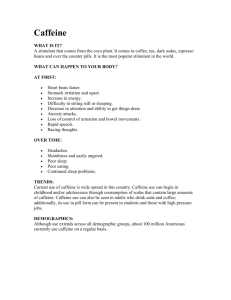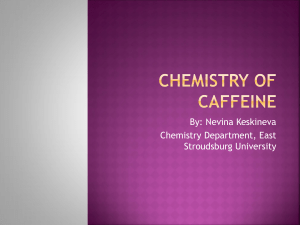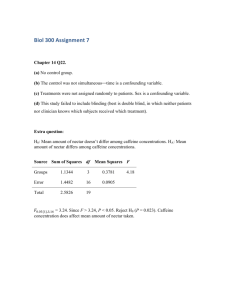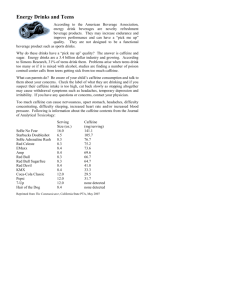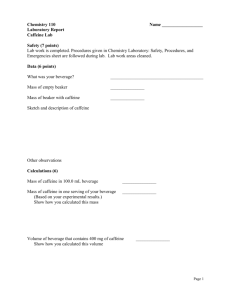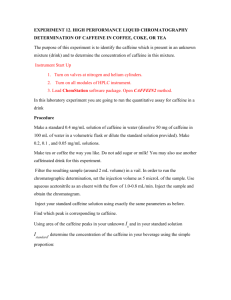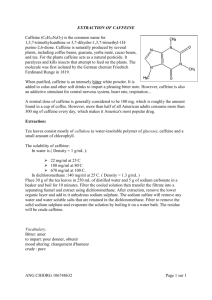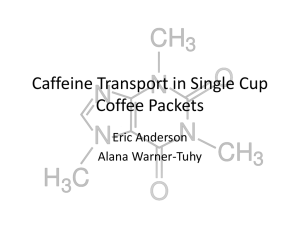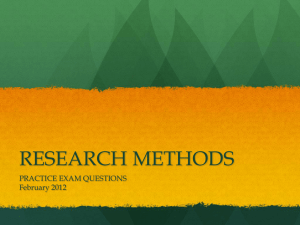example caffeine report
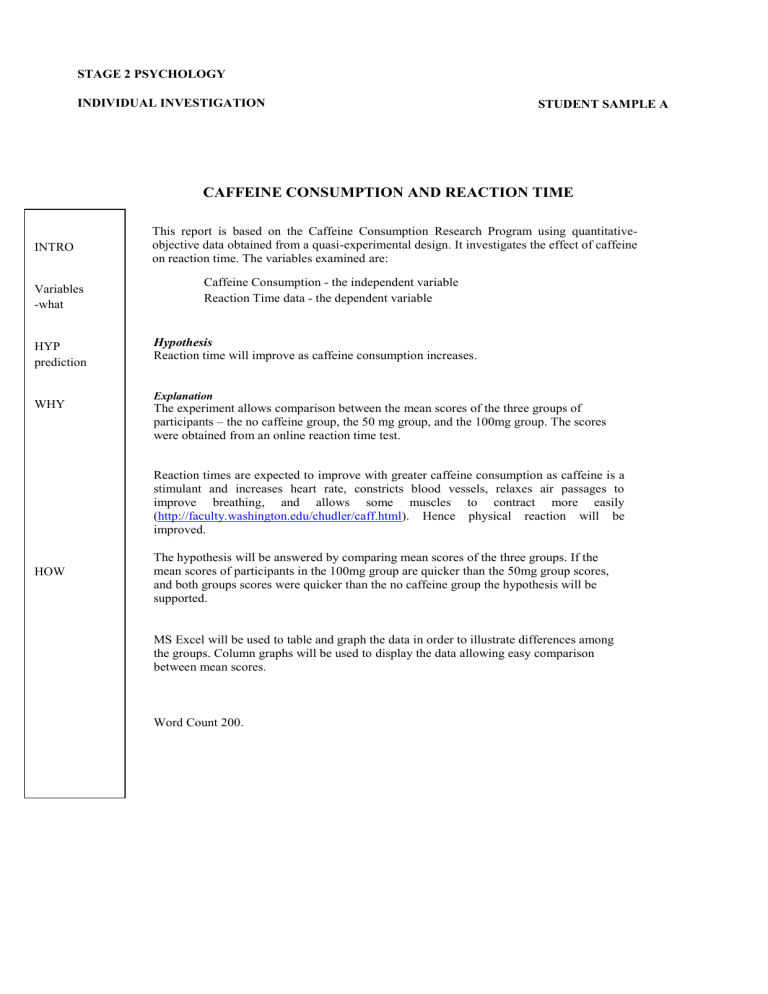
STAGE 2 PSYCHOLOGY
INDIVIDUAL INVESTIGATION STUDENT SAMPLE A
INTRO
Variables
-what
HYP prediction
WHY
HOW
CAFFEINE CONSUMPTION AND REACTION TIME
This report is based on the Caffeine Consumption Research Program using quantitative- objective data obtained from a quasi-experimental design. It investigates the effect of caffeine on reaction time. The variables examined are:
Caffeine Consumption - the independent variable
Reaction Time data - the dependent variable
Hypothesis
Reaction time will improve as caffeine consumption increases.
Explanation
The experiment allows comparison between the mean scores of the three groups of participants – the no caffeine group, the 50 mg group, and the 100mg group. The scores were obtained from an online reaction time test.
Reaction times are expected to improve with greater caffeine consumption as caffeine is a stimulant and increases heart rate, constricts blood vessels, relaxes air passages to improve breathing, and allows some muscles to contract more easily
( http://faculty.washington.edu/chudler/caff.html
). Hence physical reaction will be improved.
The hypothesis will be answered by comparing mean scores of the three groups. If the mean scores of participants in the 100mg group are quicker than the 50mg group scores, and both groups scores were quicker than the no caffeine group the hypothesis will be supported.
MS Excel will be used to table and graph the data in order to illustrate differences among the groups. Column graphs will be used to display the data allowing easy comparison between mean scores.
Word Count 200.
REPORT
Introduction
The experiment was conducted as part of our stage 1 psychology unit on brain and behaviour. We were examining the effects of a drug (caffeine) on our physical and psychological state. Other variables tested included comprehension and mood.
Caffeine is a central nervous system stimulant . In moderate doses, caffeine can:
increase alertness
reduce fine motor coordination
cause insomnia
cause headaches, nervousness and dizziness
In massive doses, caffeine is lethal. A fatal dose of caffeine has been calculated to be more than 10 grams (about 170 mg/kg body weight) - this is the same as drinking 80 to 100 cups of coffee in rapid succession ( http://faculty.washington.edu/chudler/caff.html
).
Hypothesis
Reaction time will improve as caffeine consumption increases.
Method
The sample was chosen from the stage 1 psychology class who were divided into 3 groups of 5 and given an unknown quantity of caffeine in a pepsi drink. Group 1 had no caffeine, group 2 had 50mgs and group 3 had 100mg. After a half hour wait (for the caffeine to be absorbed and have an effect) the participants took part in an online reaction time test and recorded their mean scores from 5 tests (( http://topendsports.com/testing/reactime.htm) .
Participants
There were 15 participants ( 8 female, 7 male) all chosen as members of the Stage 1 psychology class. Ages ranged from 15 to 17 years. All were residents of a small remote city.
RESULTS
Graphs and tables –explaining line of the results
caffeine effect on reaction time
1.500
1.000
0.500
0.000
no caffeine
1/2 caffeine full caffeine
1
1.335
0.355
0.453
group
Graph 1 shows that the ‘no caffeine’ group had a much worse mean reaction time than the caffeine groups.
However reaction times were best among the 50mg caffeine group and decreased slightly among the 100mg group.
Individual reaction scores
4.5
4
3.5
3
2.5
2
1.5
1
0.5
0 none half individual scores by group full
DISCUSSION
Interpreting & analyzing results –what do the results suggest and what does this mean. First – was the hyp supported e.g.
The hypothesis that reaction time will improve as caffeine consumption increases was not supported. Although there was a significant improvement in reaction time for the 50mg group over the no caffeine group, there was a decrease in reaction time in the
100mg group. What this means is that….
This suggests that too much caffeine over stimulates the…
Previous research on caffeine effect on reaction time similarly found that…
SAMPLE
Discuss the effects of the sample – has the small size meant that one participant’s results could have skewed the data? – is sample large enough to draw a meaningful conclusion. Is the Sample representative of the general population?
STRENGTHS & WEAKNESSES
Advantages and disadvantages with the experiment – what was done well, what not – were there any extraneous variables that may have influenced results – e.g. was control over participants’ fast from caffeine products strict enough. How could we improve this experiment?
ETHICAL CONSIDERATIONS
Ethics – what were the major ethical considerations were these met and how so?
Conclusion – sum up – again state whether hypothesis was supported and how we could continue/improve this study.
BIBLIOGRAPHY
Use Harvard Referencing system – see page s 25-26 of the Jacaranda Stage 1 Psychology text.
